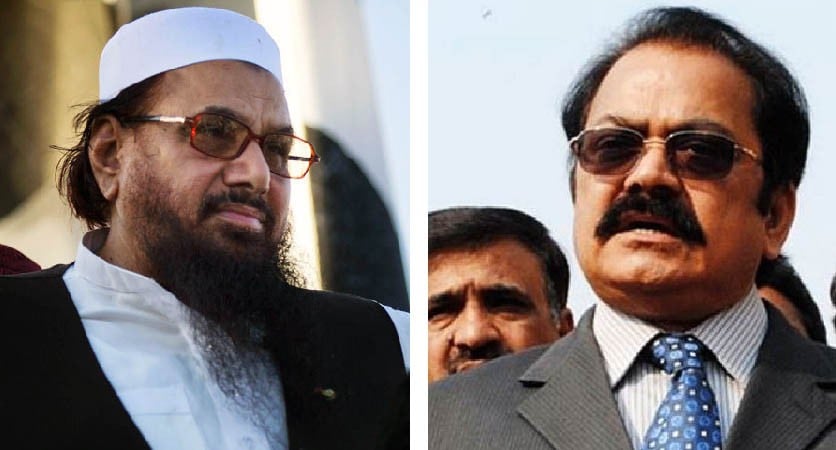
The political support for militant groups in Punjab -- from political parties as well as state agencies

Although Prime Minister Nawaz Sharif and his party have been trying to distance themselves from the rightwing politics of the 1990, their opponents accuse them of maintaining contacts with groups like Sipah-e-Sahaba, a banned sectarian group blamed for the deaths of hundreds of Shias.
From Jhang district to Dera Ghazi Khan, PML-N leaders were seen openly courting banned outfits’ supporters during the last election campaign. But PML-N leaders have categorically denied this, saying that banned groups operating in the province have lost their support.
"Yes I do (see an alignment between political and militant groups). Not just in South Punjab but across Pakistan. Religious money backed by specific sectarian interests created religious millionaires and billionaires," says Awais Khan Leghari, PML-N MNA.
Leghari who belongs to South Punjab further says, "These moneyed people use money to acquire influence and power and, in turn, end up at places where they can influence or try to influence policy-making. Some of these religious billionaires surely are facilitating militant wings across the country."
About twelve small and big gangs, like the "Chotu Gang", are operating in Dera Ghazi Khan, Rajanpur, Rahim Yar Khan, Layyah, Jhang, Muzaffargarh and Bahawalpur, locals of South Punjab tell TNS.
They include: ‘Ledy Gang, Zanglani Gang, Aziz Jarwar Gang, Bashira Gang, Sihani Gang, Chutkani Gang, Kajlani Gang and Mureeda Nukani Gang. All these groups have political backing of the local landlords who also represent the people in Parliament.
"There has been a strong support for extremist groups from political figures, namely Jaish-e-Muhammad (JeM), Furqan-ul-Quran, Khudam-ul-Islam, Lashkar-e-Toiba (LeT), Jamat-ud-Dawa (JuD), Falah-e-Insaniat Foundation (FIF), Sipa-e-Sahaba Pakistan (SSP), defunct Ghazi Force, Laskhar-e-Jhangvi, Ahle Sunnat Wal Jamaat (ASWJ), Punjabi Taliban and some scattered militants. They also have a soft corner for the Islamic State (Daish) in the area," says Sardar Akhtar Gorchani, a local landlord in Rajanpur and Ghazanfar Lund, a local in Taunsa.
"These groups, even once enjoyed support of Pakistan Tehreek-e-Insaf, Pakistan Peoples Party, Jamaat-e-Islami, Jamiat Ulema-e-Islam in the last 2013 general elections and later in local body polls," they say.
"Yes, there is a huge possibility that these gangs could do anything to even facilitate terrorist groups in any way that money could buy," Leghari says.
Dr Rasul Bakhsh Rais, professor of political science at the Lahore University of Management Sciences (LUMS) does not see any support of political parties to militant groups. "I don’t think that there is any political party’s support for militants and extremists in Punjab. Yes, there was a time in electoral politics when SSP workers enjoyed backing of some political parties in many areas of Punjab. Now things have changed -- military operation has started, feudal minds have distanced themselves from such groups -- even the ruling PML-N leaned towards moderate politics. Even the tableeghi Jamaat, defunct Ghazi Force and Maulana Aziz of Lal Mosque, who once enjoyed huge support, are gradually losing ground in the region."
Many experts still believe that there are some groups like the JuD which continues to enjoy the backing of various state agencies in Punjab. They recall that Jaish-e-Muhammad and LeT have been openly running their camps under the nose of the state. Interestingly, both groups continued to be treated by both civilian and military establishment as good friends in the past and were allowed to expand infrastructure in the province, they say.
"It’s time for the military to decide -- either to let such militant groups operate anymore or to rein them in (militant groups) in Punjab" says Lt. General (retd) Talat Masood. "Military operation in Punjab will alter the thinking of political parties, such as PML-N, JI, and JUI-F, etc, which sought short-term support of such militant groups in electoral politics," he believes. "Actually, political parties and civilian government should clean the mess in South Punjab rather than involving the military to cope with militant groups in the province," he adds.
In "Contextualising militancy in Punjab," Dr Ayesha Siddiqa, a security expert, sees little difference between Prime Minister Nawaz Sharif’s party and Imran Khan’s PTI as far as their support for militant groups in the province is concerned. "The logic for continued friendship (with LeJ, LeT and JeM) is that the operation was conducted by splinter groups and not the mother organisation. Getting rid of them (militant groups) at this stage is not hugely difficult either. In Punjab and Sindh, where these are spreading rapidly, they could be removed through an intense intelligence and police operation. It is mainly the intent and planning that could get things going," she writes.